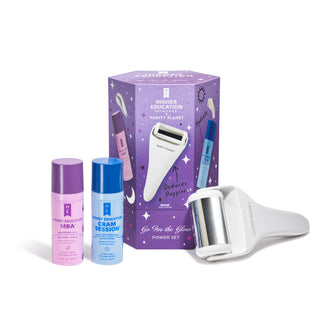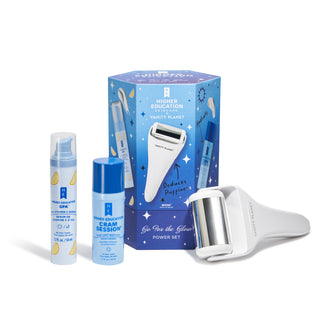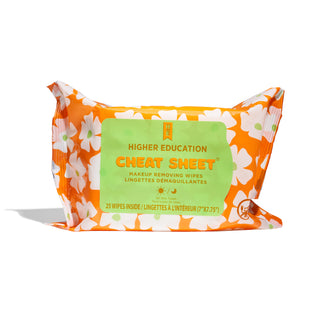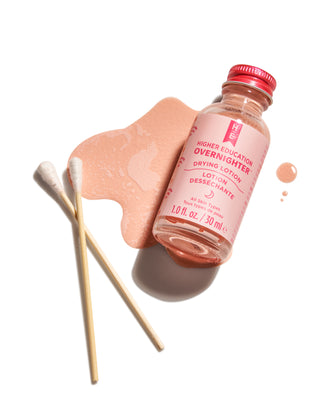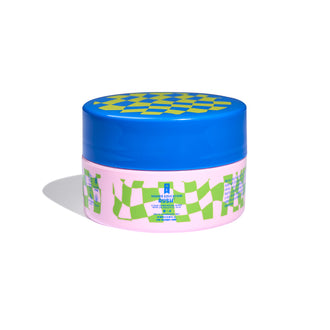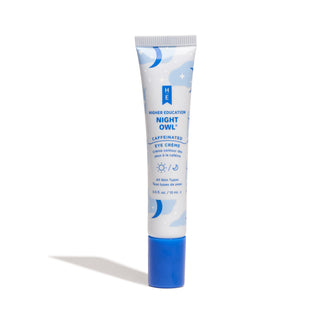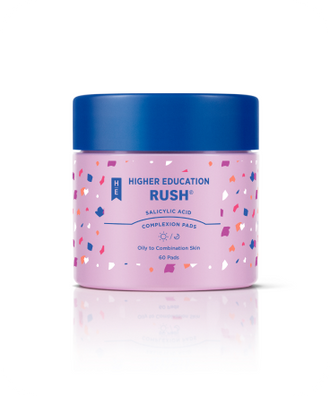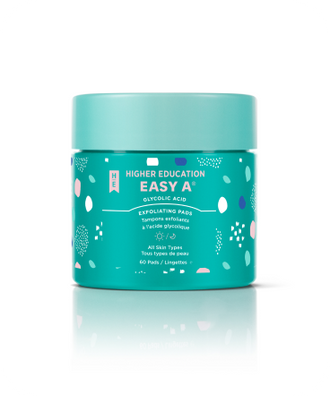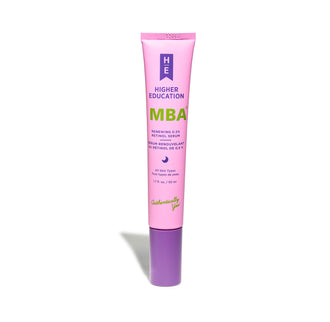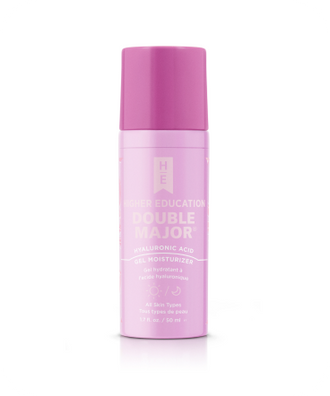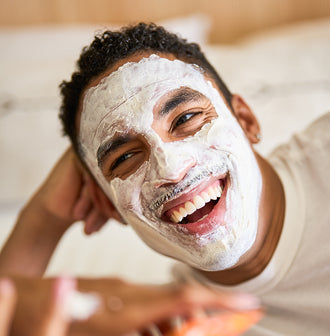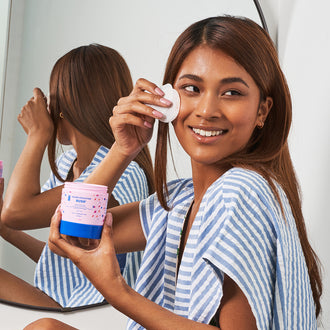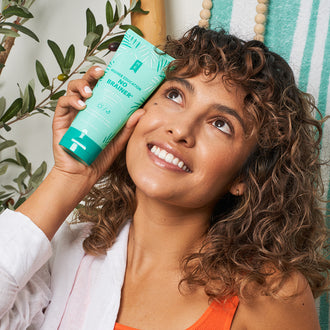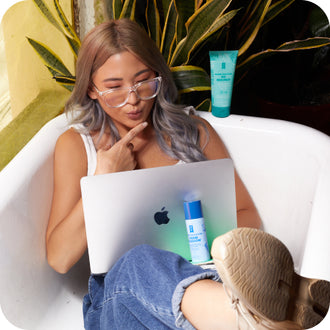
It's about that time: school is back in sesh and students begin to feel the first wave of post-syllabus induced stress, late nights out, and dining hall food/copious Postmates deliveries. However, these fall semester woes may not give way to the healthiest skin.
The everyday struggles of the collegiate lifestyle can lead you to analyze your skin care needs and invest in skin care (also, self-care), for the first time. I still have flashbacks in horror remembering Recruitment Week breakouts or the stress-induced blackheads from stress eating during finals week (which I could never really combat because I wasn't properly educated on skincare).
We went straight to the best source we know to get not just answers but the right answers from Higher Education Skincare's partnering Dermatologist Dr. Susan W. Cox, M.D. Dr. Cox is not only a total Lady Boss but Newport Beach's leading Board-Certified Dermatologist and expert in her field. Over the course of 30 years, she has nurtured her own highly successful medical practice treating a wide variety of conditions and clientele. However, Dr. Cox's specific interest with Gen Z and repairing their troublesome skin concerns grabbed our attention.
We went straight to Dr. Susan Cox herself to get her answers to the 7 most popularly asked questions from college students in her office (you can even print them out & put them in your bathroom).
1. HOW DO I DETERMINE MY SKIN TYPE?
In my office, this question is usually accompanied by my patient dumping a pile of purchased and partially used skin care products on the counter, which would be bewildering and possibly overwhelming to anyone let alone someone new to the skincare game. Below is a brief guide to skin types, but the Higher Education Skincare website has a great overview as well.
DRY SKIN:
You most likely have fine pores and experience minimal acne. After washing your face when you wake up, your skin may feel tight and dry. Your skin may tend to be dull or have dry, flaky spots. With dry skin, moisturizing frequently is necessary.
OILY SKIN:
Oily skin usually appears thicker and may feel greasy when you wake up in the morning and again by mid-day. You may find yourself blotting away the shine multiple times daily. Oily skin tends to be more prone to black heads and white heads: which can also appear on your upper back or chest. Find a sunscreen and moisturizer specifically formulated for oily skin that helps hydrate without creating excess moisture or oil.
COMBINATION SKIN:
Just as the name suggests: your skin tends to be a combination of Oily & Dry. Usually your forehead, nose and chin are oily ("T-Zone") while your cheeks are dry. You may find products for oily skin too drying and dry skin products too oily. Acne may appear in your T-Zone.
SENSITIVE SKIN:
Your skin is typically dry and can be easily irritated. If it's also Acne Prone, you may have trouble tolerating acne products. You might need to be cautious of skincare products with added fragrance.
2. WHAT INGREDIENTS DO I LOOK FOR IN ACNE PRODUCTS?
Most acne products will contain salicylic acid, glycolic acid, lactic acid, retinol or benzoyl peroxide. These ingredients have both exfoliating properties that help unclog pores as well as antibacterial properties that help fight acne. Additionally, they aid in cell turnover which helps to even skin tone and diminish marks left by breakouts. For those with oily skin, they can be drying. Higher Education has multiple products to help combat acne, including HIGHER EDUCATION PRE-REQ® Purifying Facial Cleanser with Glycolic Acid and Tea Tree Oil, RUSH® Salicylic Acid Complexion Pads and Lactic Acid and MBA® Renewing 0.5% Retinol Serum.
3. DOES WHAT I EAT AFFECT MY ACNE?
Certain foods or diets can have some effect on the skin but there's not necessarily one specific food that can be blamed as the 'acne-culprit' for everyone. Acne is an inflammatory condition and there has been some research that shows following a low glycemic diet (one low in refined carbohydrates) may be beneficial to acne-prone skin. This means avoiding foods based on white flour as well as sugar, including sugary sodas (try to avoid the soda fountain in the dining hall). Refined carbohydrates may also worsen acne due to the effects they have on hormones.
There is some information that implicates dairy products in the formulation of acne, but more research is needed to make a direct link. Anecdotally, some of my patients note that removing dairy from their diet is helpful.
Overall, watch for any repeatable food triggers and attempt to remove them from your diet. Remember that it may take several months to see the results of these diet changes. Many mothers request that I relay to their teens that fast food is to blame for their acne; there is no direct link other than the fact that most fast food contains refined carbohydrates and sugar. Taking a daily probiotic helps to maintain gut health, which is crucial in fighting inflammation. A well-balanced diet and staying hydrated will help you to achieve optimal results from your skin care routine.
4. HOW LONG UNTIL I SEE RESULTS?
"That may depend on the condition of your skin and the severity of your problem. Those with Dry skin that use a moisturizer containing Hyaluronic Acid may notice an immediate glow and supple feeling. DOUBLE MAJOR® Hyaluronic Acid Gel Moisturizer is formulated for Oily/Acne Prone skin and does just this. If you have acne, it can take 2-3 weeks to start to see results. If 4-6 weeks go by without improvement, it may be time to make an appointment with your dermatologist. "
5. WHAT TYPES OF PRODUCTS SHOULD I USE IF I HAVE ACNE PRONE SKIN?
"Those with acne prone skin should use products that are oil-free and non-comedogenic (doesn't clog pores). Even if you have oily skin, you still need to use sunscreen; HIGHER EDUCATION SPRING BREAK® Oil-Free Sunscreen SPF 30 is non-comedogenic and oil-free. If you have dry, sensitive or combination skin, acne products may leave uncomfortable dry patches and will need a moisturizer to hydrate those areas. Higher Education makes a refreshing oil-free moisturizer called DOUBLE MAJOR® Hyaluronic Acid Gel Moisturizer."
6. WHAT ARE SIGNS OF SUN DAMAGE AND WHAT DO I DO IF I NOTICE THEM ON MY SKIN?
For most young people, the first signs of sun damage are freckling and uneven pigmentation. College is a time when you may start to see some very fine lines caused by sun damage. Daily sunscreen is an absolute must in preventing further damage. It's important to use products that have antioxidants such as Retinol, Vitamins A, C and E that can help to restore collagen and elastin and repair damaged DNA. Products such as HIGHER EDUCATION EASY A® Glycolic Acid Exfoliating Pads and RUSH® Salicylic Acid Complexion Pads with Glycolic Acid and Lactic Acid can help to even skin tone and pigmentation.
7. IF THERE'S ONE THING I SHOULD REMEMBER ABOUT SKIN CARE IN COLLEGE, WHAT IS IT?
"I think the most important thing is to establish a simple, easy to follow, skin care routine that can be maintained on a daily basis. This can be achieved with as few as 3-4 products daily, including your face wash."
A few additional tips to remember:
• ALWAYS cleanse your skin at least twice daily and after exercise. Taking off your make up every night is an absolute must.
• Wear sunscreen every day.
• Use an exfoliating scrub 1-2 times per week to help clear clogged pores & get rid of dead skin cells.
• Use products with antioxidants to repair damage from sun, pollution and blue light that radiates from your phone and computer. CRAM SESSION® Blue Light Blocking Moisturizer is a great solution to these college woes that may cause skin damage. CRAM SESSION® works as a hydrating lotion with added melanin to help protect the skin from damaging blue light emitted from your laptop.
Hopefully, this helped to answer some of the burning questions you have about skincare during your college years. Of course, these are just a few of the questions and concerns that come up over your glorious time on campus. Skincare is so important during your college years: your skin is experiencing new conditions and combating concerns it hasn't before. As more questions arise or more concerning skin concerns arise, you may need to consult a dermatologist.


